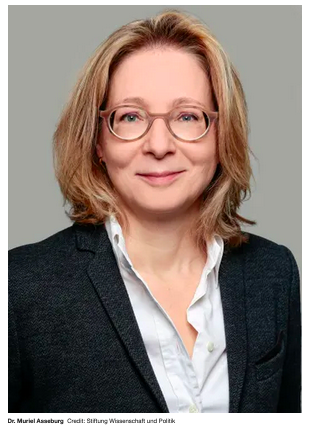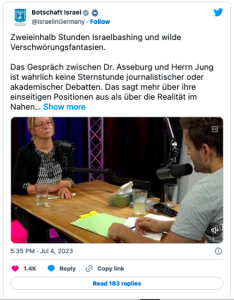Why Israel Is attacking Germany’s top Middle East expert

JVL Introduction
A new row has broken out in Germany where criticism of Israel is usually very muted.
Muriel Asseburg, one of Germany’s most renowned Middle East experts gave an extended podcast interview which has ruffled the Israeli ambassador’s feathers.
So he distorted and misrepresented what she said and launched a personal attack on her to boot.
Asseburg refused to be browbeaten and responded robustly as you can read in this report of the spat below.
RK
This article was originally published by Haaretz on Mon 10 Jul 2023. Read the original here.
Why Israel Is attacking Germany's top Middle East expert
Muriel Asseburg says the Israeli embassy manipulated her quotes, while her workplace, a prominent German think-tank slammed the embassy’s ‘insinuations and personal defamations’ against her
The Israeli embassy in Germany is publicly attacking one of the leading Middle East experts in the country, following a lengthy interview in which she discussed the Israeli occupation in the West Bank and Germany’s policy on the subject.
In a series of tweets which have been viewed by hundreds of thousands of people, the embassy in Berlin has accused Dr. Muriel Asseburg of “Israel bashing and wild conspiracy fantasies”, as well as “trivialization of terror.”
Asseburg is a prominent political scientist at the German Institute for International and Security Affairs, a think-tank supported by the German government. Her work focuses on the Middle East, and she has written extensively in the last three decades on Israel and its neighbors. Asseburg is visiting Israel this week for a conference, and in a conversation with Haaretz she strongly denied the embassy’s allegations. She has visited Israel dozens of times since the 1990s.
The embassy’s attack started last week after Asseburg appeared on a popular podcast hosted by journalist Tilo Jung to discuss the situation in the Middle East. Jung hosts one of the most successful German podcasts on current affairs, which is particularly popular among younger listeners. During the two-and-a-half hour interview, Jung and Asseburg spoke mostly about Israel and the Palestinians, although they also discussed the situation in Syria and also touched on Ukraine.
The embassy responded with a Tweet published on July 4 which stated that the conversation between the two was “not a great moment of journalistic or academic debate”, and accused them of holding “one-sided positions” regarding the Middle East. It further stated that “For Ms. Asseburg, terror is not terror, Israel is somehow like Russia and the Bundestag is under the control of the Israeli government.” The tweet ended with the sentence “Muriel Asseburg never misses an opportunity to insult Israel, and yet she has the chutzpah and cheek to present herself as a friend of Israel.”

In response, her workplace offered strong backing, writing that “Muriel Asseburg is a renowned Middle East expert. We reject the current insinuations and personal defamations. We support our long-standing colleague without reservation and expect respect and courtesy in our dealings.”
The embassy in return doubled down, writing: “we will not be respectful if someone calls us an apartheid state. We will not be polite to anyone who accuses us of controlling the Bundestag and conspiring with the AFD, so to speak, to pass Bundestag resolutions.”

Asseburg was also criticized in an article published on Monday by journalist Jurgen Kaube in the Frankfurter Allegmeine Zeitung, for falsely comparing Israel to Russia. Kaube, the paper’s opinion editor, wrote: “Asseburg accuses the West of not seeing the similarities between Russia and Israel. She doesn’t mind that her analogy is far-fetched. Ukraine does not drop Molotov cocktails and does not send missiles into Russian territory. Israel commits multiple violations of international law, but it is not waging a war of annihilation against Palestinians or against Palestine, which is an imaginary country.”
Asseburg told Haaretz on Sunday that she was surprised by both the content and tone of the embassy’s response, stating that it manipulated her quotes. She said she had been criticized in the past for statements related to Israel, but never like this, and that perhaps the new tone was related to the far-right nature of Israel’s current government.
She denied equating Israel and Russia, as the embassy had accused her of doing, and said that on the podcast interview, “We were speaking about Russia-Ukraine and Israel-Palestine, and both of us did not equate these two situations, we don’t think they’re equal. But what we did speak about is the different perceptions in Germany of Ukrainian resistance to Russian aggression and anything that Palestinians do in terms of resistance against the occupation. I said that Palestinians often say there is European double standard in Europe on this issue.”

She added that “violence against Israeli civilians, arbitrary rocket attacks on Israelis, those are illegitimate, I do not condone terrorism and will not belittle it.”
On the apartheid issue, Asseburg said that “I don’t call Israel an apartheid state. What I do is, I refer to the debate that has been taking place in the international human rights community, including Israeli human rights groups, and I explain that these people use the legal definition of apartheid. I also explain that there is no consensus on what that includes – some would claim it exists only in the West Bank, some also include Israel, other also the refugee question. But if it is an apartheid reality or not, it is not for me to determine, of for the embassy, it’s a legal question.”
She rejected the embassy’s claim that she had alleged Israeli “control” over the Bundestag or Israeli cooperation with the far-right AFD party, saying that this was a wrong representation of a discussion she had on the podcast regarding anti-BDS legislation in Germany. “I said that AFD came out with a draft resolution against BDS first, and that put a lot of pressure on lawmakers in other parties to do the same, so that AFD won’t own this issue and can’t present itself as the best friend of Israel. It’s absurd to say that I said Israeli colluded with AFD, that’s not true.”
Asseburg said that in her view, Germany is torn between the two most important commitments it has taken upon itself in the aftermath of the Holocaust: support for Israel and the Jewish people, and support for human rights and a liberal world order. “The more there is a contradiction between these two main lessons from German history, the more that will produce problems for Germany,” she explained. She added that Germany has “a special responsibility to Israel,” but that this should not serve as a “shield” for Israeli human rights violations.
In her view, the response from the embassy reflects the changes happening on the ground in Israel and the occupied territories. “The conflict is escalating, and we have a new government in Israel that rejects the two-state solution, rejects negotiations and rejects even joint conflict management with the Palestinian Authority. They are advancing annexation instead. As a result, there is more debate about human rights and the apartheid question, and a very aggressive discourse from Israel in response.”
Israel’s Ambassador to Germany, Ron Prosor, told Haaretz on Monday that “It is indeed easy and convenient to turn this discussion into an exchange of accusations of ‘silencing’ or ‘anti-Semitism.’ Instead, I suggest taking notice to the words that Asseburg said herself: that Israel meddles with Germany’s internal affairs by promoting federal legislation; she signifies support of harming Israeli civilian population, and in the same breath supports the position that Israel should be prosecuted for war crimes at the International Court of Justice in The Hague.”
“However,” the ambassador added, “have we witnessed the same firm and unequivocal statements from her when it comes to the generous Palestinian funding of families of terrorists? Was her voice heard during Abu Mazen’s infamous ’50 Holocausts’ speech? Or as an international law expert, has she spoken out against Hamas’s use of children as human shields? The answer is, of course, no.”
Prosor also stated that “her positions consistently lean one-sidedly against Israel. Over the years, she has frequently criticized Israel under different heads of government. While the Israeli embassy is prepared to face criticism, it appears that Asseburg herself finds it difficult to do so, especially under the cover of academic freedom and freedom of expression.”
Dr. Nimrod Goren, an Israeli researcher and founder of Mitvim, a think-tank promoting regional foreign policy in Israel, has collaborated with Asseburg over the years on several research projects. He characterized the attacks on her as “unfair”, telling Haaretz: “Dr. Muriel Asseburg is one of Europe’s leading experts on Israel and the Middle East.”
Goren added that after working with her for a decade, he has witnessed that she “cares about the future and welfare of the state of Israel. She regularly visits Israel, takes part in strategic dialogues with Israeli counterparts and meets Israeli officials to discuss developments in the region. She is strongly committed to advancing democratic values and will criticize policies that point in the opposite direction. We should welcome international experts of her stature who visit Israel on a regular basis, meet Israeli officials and experts, and promote dialogue with Israel regardless of any disagreements. The Israeli embassy’s choice to attack her is a grave mistake.”
Another Israeli who has worked with Asseburg in the past, and asked to remain anonymous in order to speak freely on the subject, described her to Haaretz as “a tough critic of Israel, and someone who is often very negative in her writing, but not an antisemite, a BDS supporter or an Israel-hater. She is a respected voice in Germany, and it’s good for us to work with her and be able to share our point of view, even if we don’t always like what she has to say.”
This week, Asseburg is in Israel for a conference organized by the Institute for National Security Studies, one of the most important think-tanks in Israel. She told Haaretz she was happy to return to Israel and take part in the event, despite the recent controversy. “It’s important for me to have regular dialogue with colleagues in Israel,” she said.

1. The far-right AfD is the most pro-Israel party in Germany: https://www.israelnationalnews.com/news/373375
2. There are close links between Netanyahu’s (who is even more openly extreme than he is) and the AfD: https://jacobin.com/2021/09/germany-afd-zionism-antisemitism-israel-nationalism
2. The AfD includes has (neo-)fascist and antisemitic supporters, and on these grounds is being monitored by Germany’s internal intelligence agency, the BfV: https://www.opendemocracy.net/en/can-europe-make-it/antisemitic-turn-of-alternative-for-germany-party/; https://www.reuters.com/article/us-germany-security-afd-idUSKBN2AV1M3
3. Germany has repeatedly accused pro-Palestinian German Jews and Jewish Israelis living in Germany of antisemitism: https://mondoweiss.net/2019/03/apartheid-accuser-accused/ – while in Britain, Jewish Labour Party members are 5 times more likely to be accused of antisemitism than non-Jewish Labour Party members.
__________________________________________________________________
We are living the world of moral madness.
We need to stand in solidarity with journalists like Muriel who give us the facts. Smears against her show that she has had them rattled. My country of birth needs to learn to accept reality, the weaponizing of anit-semitism, stand up for peace and justice, rather than fall over backwards because of a feeling of internalised guilt. The lesson to learn is to challenge those in breach of international laws, those who oppress others. We have seen the devastating effects fascism has on people and countries. And 1 for one do not want it to happen again. It is time to stop the oppressors.
Professor David Miller should have received this level of support from his employer (Bristol Uni) when he came under attack. He’s still raising the funds to take Bristol before an Industrial Tribunal alleging unfair dismissal.